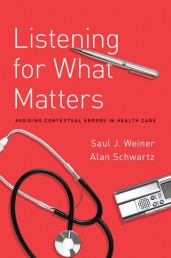Listening should be part of every patient’s care plan, new book says
For physicians, listening to a patient is more than hearing a heartbeat or cough.
In the new book, “Listening For What Matters: Avoiding Contextual Errors in Health Care,” University of Illinois at Chicago researchers Dr. Saul Weiner and Alan Schwartz conducted studies over 10 years to explain how and why doctors may fail when diagnosing and treating patients, even when they have the science right.
Hundreds of doctors visits by actors and real patients were secretly recorded so Weiner and Schwartz’s research team could learn how often doctors picked up on clues – or “contextual red flags” – that something in a patient’s life needs to be addressed for a care plan to be effective.
“If a patient makes comments such as he is unable to afford an expensive brand name medication after losing health insurance coverage, we would observe whether the doctor picks up on the clues and prescribes a lower-cost generic medicine,” said Weiner, a board-certified internist and pediatrician with practice, leadership and research experience in a wide variety of healthcare settings.
“Our studies document that physicians are frequently overlooking crucial clues about patients’ individual life circumstances and making medical errors as a result,” he said. He and Schwartz, who is a cognitive psychologist, term those “contextual errors.”
Schwartz, who is the Michael Reese endowed professor of medical education at the UIC College of Medicine, said contextual errors are costly and pervasive, and they are not being adequately addressed by either the American healthcare system or medical schools.
In the book, published by Oxford University Press, Schwartz and Weiner discuss:
- How they created false identities and health insurance documents for the actors playing patients in their first experiment, and how they trained actors to pose as patients.
- Stories from actors and patients who went undercover.
- Why doctors frequently miss clues, even when “red flags” seem obvious.
- How medical schools can better train healthcare professionals to listen carefully and engage with each patient to improve health.
- Why contextualized care is more cost-effective, and why it doesn’t have to take more time.
- What patients and family members can do when they feel professionals aren’t listening to them.
- How two large Veterans Administration hospitals treated real veterans.
- How the poor, or those of a different ethnic or cultural background, are treated – and why looking for contextual clues from such patients is especially vital.
Much of the writing about healthcare-quality falls into two broad categories, Schwartz said. The focus is either on improving the science and safety of care through evidence-based medicine, or it’s on “humanistic medicine,” which emphasizes empathy and good communication.
“We wrote this book to chart a new direction, incorporating something from each of the two major categories,” Weiner said. “Our focus is on whether healthcare providers who interact with patients understand that their role is entirely to help patients solve their healthcare problems, and whether they have learned how to do that effectively when faced with uniquely individual patients.”
